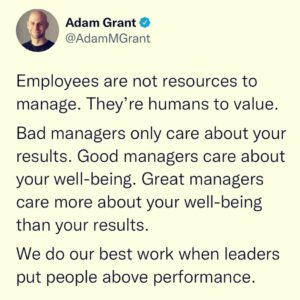As I was scrolling through LinkedIn this week, I stumbled across this post from the prolific Adam Grant.

The post was promoting an interview he had done with Prince Harry about mental health at work.
Given the amount of writing and speaking I do about well-being and compassion in management, you might assume I’d read this and burst out with an “Amen!”
But you’d be wrong.
While I am sure Adam’s intentions are probably right on, the message of this post is wrong. Not all of it, but the punchline is bad advice.
Valuing people at work. Yes!
Good managers care about your well-being. Yes!
Great managers care more about your well-being than your results. WRONG.
Hear me out.
The purpose of any organization is performance. That organization needs to produce goods or services of value to others and do it in such a way that they are able to stay in business.
Everything an organization does in the service of staying in business can be thought of as performance. And to achieve this performance, they hire people to do jobs. The purpose of these jobs is to contribute in specific ways to organizational performance.
Here’s the point. No performance = no organization = no jobs.
Performance is why we have jobs, and it’s why managers exist: to help others perform their jobs successfully.
Adam’s post reads as though you don’t need to concern yourself with results and performance. That is bad advice, and I’d be surprised if that’s what he meant.
Well-Being vs. Results
This is a false trade-off.
When we say things like “managers need to put well-being before results,” we’re assuming that the problem with bad management is simply their priorities. It’s not.
Managers aren’t choosing between focusing on results and caring for people’s well-being, at least not consciously.
What’s happening in most cases is that managers don’t know it matters or have any idea how to care for the well-being of their people.
Instructing these managers to put the well-being of their people ahead of results isn’t going to solve anything. It sounds just like another in a long line of HR directives they have learned to ignore.
Caring for well-being and focusing on results are not in opposition. In fact, caring for your employees’ well-being is perhaps one of the most powerful ways you can support them in achieving great results.
Well-being is vital to performance but alone isn’t enough.
Performance is always the Goal
This is the point I want to make here: Performance has to always be first. As a manager, if you aren’t helping an employee perform successfully, it won’t be long before both of you are without jobs.
Well-being is part of how a “Great” manager accomplishes this. They facilitate the employees’ success and performance by supporting their well-being.
At the same time, great managers work equally hard to create clarity of expectations, provide coaching, and show appreciation. It’s all a part of the equation that produces performance.
And performance is what keeps our paychecks coming.
Being a great manager isn’t about putting well-being ahead of results, it’s about understanding and embracing well-being helps fuel high performance leading to success all-around.
***
If you are not subscribed to my email list and would like to receive great content like this delivered straight to your inbox each week, click here to subscribe.


“As a manager, if you aren’t helping an employee perform successfully, it won’t be long before both of you are without jobs.
Well-being is part of how a “Great” manager accomplishes this. They facilitate the employees’ success and performance by supporting their well-being.
At the same time, great managers work equally hard to create clarity of expectations, provide coaching, and show appreciation. It’s all a part of the equation that produces performance.
And performance is what keeps our paychecks coming.
Being a great manager isn’t about putting well-being ahead of results, it’s about understanding and embracing well-being helps fuel high performance leading to success all-around.”
This is a good message, and we must always balance back to the business purpose. The challenge is that there has been so much emphasis on performance and profit that it has long overridden any need for concern about the humanity of working together. Quite a bit of the old school approach to success and the value of “human capital) (a truly egregious term) strongly devalues individual employees and their lives beyond their workplace success.
This aspect of our western culture has contributed to isolation, disconnection, and a crisis of mental health. We need to strongly emphasize the need for humanity and properly acknowledge and utilize the talents of corporate c contributors as we move out of the dark ages of indentured slavery.
Adam may have been wrong in his declaration and such errors will be common until we catch up (and in fact may help us catch up) on keeping work livable.
I know you are an advocate, and yet I see too much obsolete and damaging rhetoric out there that needs to be strongly tempered. I’m glad to see you recategorize productivity to something that includes humanity. P.S. Susan Cain’s BITTERSWEET has a great chapter on the topic that traces how we got to this point of overwhelm in reaction to words like, “Productivity,” and Success.” – Chapters 5 & 6.